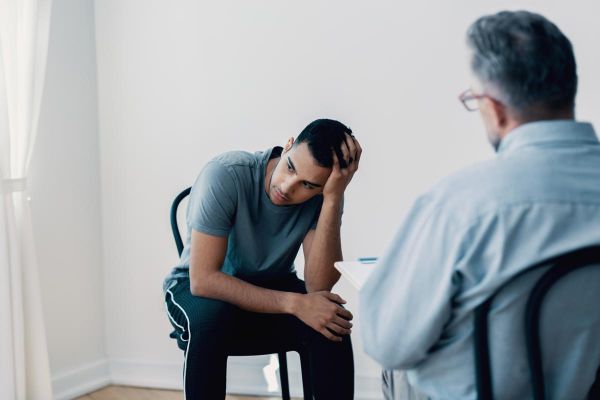 The CDC estimates some 20% of Americans suffer from chronic pain, with some 8% of us struggling with chronic pain that heavily impacts our daily lives. This pain is often treated with opioid painkillers and muscle relaxers, used to reduce the impact of pain, and allowing individuals to go back to a more comfortable life. But, for individuals who have either become addicted to those painkillers or who are moving into a chronic pain diagnosis following recovery from addiction to another substance, taking painkillers can seem like a setback, giving up, and going back to using drugs.
The CDC estimates some 20% of Americans suffer from chronic pain, with some 8% of us struggling with chronic pain that heavily impacts our daily lives. This pain is often treated with opioid painkillers and muscle relaxers, used to reduce the impact of pain, and allowing individuals to go back to a more comfortable life. But, for individuals who have either become addicted to those painkillers or who are moving into a chronic pain diagnosis following recovery from addiction to another substance, taking painkillers can seem like a setback, giving up, and going back to using drugs.
Living with chronic pain in recovery isn’t easy. Painkillers may be necessary. Pain increases stress, which adds to your chances of relapse. Each of these factors means that you must take extra precautions to ensure you stay in recovery. With good planning, a carefully managed lifestyle, and a good support group, you can stay clean and sober.
Talk to Your Doctor
It’s critical that you talk to your doctor before starting anything that could or will affect your health. This is especially true for an individual suffering from chronic pain, because the ramifications of major changes, exercise, or quitting medication could be considerably worse. Discuss any proposed changes with your doctor and seek out medically qualified advice before continuing.
If you’re still on medication, you want to ask questions like:
- Can I safely quit my medication?
- Can I quit my medication immediately or do I have to taper it?
- What changes am I looking at in regard to qualify of life if I quit medication now?
- What efforts can I take to reduce chronic pain outside of medication?
- Will increases in physical exercise cause more harm?
- What should I be aware of if I follow this plan?
If you’ve been to a drug rehab program, you can also choose to consult your clinicians and therapists responsible for helping you through recovery.
Develop an Exercise and Nutrition Program
Exercise and nutrition are crucial for reducing chronic pain. While it’s highly unlikely that you can entirely remove chronic pain with exercise and nutrition, studies show that many individuals greatly reduce pain to levels where they no longer need medication to manage it. For this reason, many modern approaches to chronic pain include exercise, physical therapy, and nutritional therapy alongside medication.
In one study, individuals who participated in a combined motivational therapy and exercise program reported significant increases in quality of life and reduced daily pain. In another, a Pilates-based therapeutic exercise program nearly halved reported pain over 12 months, compared to a control group. Studies also show that nutrition and eating a balanced diet can help to alleviate forms of chronic pain including rheumatoid arthritis, many intestinal disorders, and inflammation related disorders. Discuss your needs with your doctor and request a referral to a nutritionist before changing your diet.
Importantly, exercise isn’t always possible or the best option. And, most people should look at low-impact exercise like walking, yoga, or light cycling or swimming. Introducing exercise in moderation and building up to it is significantly better for your long-term health than attempting to jump into heavy or difficult exercises and potentially causing more damage and pain, which could be a major setback to your physical health and your recovery.
Attending Behavioral Therapy
 Pain management therapy, motivational therapy, and other behavioral therapies can be critical in managing chronic pain without medication or with reduced medication. Why? Changing how you think about and how you process pain will dramatically change how it impacts you and your daily life. Individuals who undergo pain management therapy actively experience less pain or a reduced intensity of pain. Studies show that even a 12-week CBT course can impact how people experience pain for over a year after the course.
Pain management therapy, motivational therapy, and other behavioral therapies can be critical in managing chronic pain without medication or with reduced medication. Why? Changing how you think about and how you process pain will dramatically change how it impacts you and your daily life. Individuals who undergo pain management therapy actively experience less pain or a reduced intensity of pain. Studies show that even a 12-week CBT course can impact how people experience pain for over a year after the course.
Treatments like Cognitive Behavioral Therapy (CBT) and Motivational Therapy are increasingly used as first-line treatments for individuals diagnosed with chronic pain. Talk to your doctor about your options to request a referral.
Stress Relief and Stress Management
Stress greatly contributes to how we feel and experience pain. Not only does stress cause its own problems, it actively prohibits the release of dopamine and serotonin in the brain, which function as pain relievers. Studies show that stress reduction reduces reported chronic pain across many types of disabilities and therapies.
What functions as stress relief? CBT, mindfulness, yoga, stress management, and other therapies all function to help. It’s important to choose a method that fits your lifestyle, budget, and current mental state, which will affect what you need. Your doctor may also have solutions. For example, you may be able to switch to NSAIDs instead of opioid medication, add on pain management therapy to compensate, and increase your risk evaluation and management.
Considering Medication
Not everyone can simply quit pain medication and be okay. That’s okay. Taking pain medication doesn’t mean you haven’t beaten an addiction. It just means you will have to be careful, rigorously follow your Risk Evaluation and Management schedule, and take extra precautions to ensure you are open and honest about how and when you are using medication. Not all 12-Step Groups are open-minded about individuals who continue to take medication. Other groups like SMART Recovery actively encourage persons taking medication to join and will help you to be accountable about it.
Talk to your doctor about your needs, your risks, and your history of substance abuse.
Healthy Habits
The key to recovering from a substance use disorder is not perfect abstinence or avoidance of drugs and alcohol. Instead, it’s about building healthy habits that allow you to manage problems like stress and pain, so you can live a happy life without taking those extra measures of getting drunk or high. This means building a life for yourself that provides enjoyment, satisfaction, relaxation, and personal fulfillment, even around chronic pain.
Healthy habits include seeing friends, regularly moving, taking care of your home, eating well, personal development, and taking time to relax and destress.
Whether you’ve been struggled with an addiction to painkillers in the past or have been recommended them because of chronic pain, you can take steps and measures to maintain your recovery. These measures primarily include working to reduce pain while improving quality of life, but you may still need medication. It’s always important to talk to your doctor and request medical advice so that you stay as healthy as possible throughout your journey.